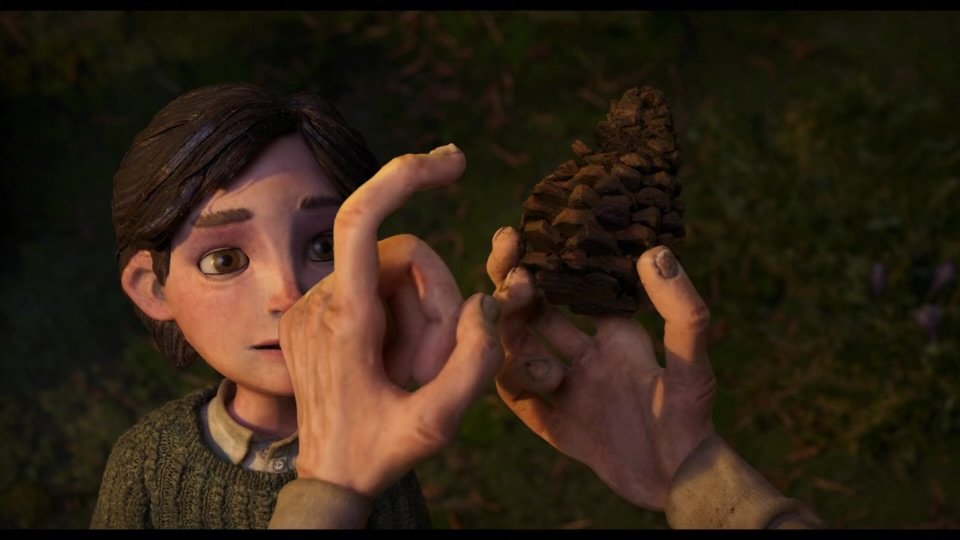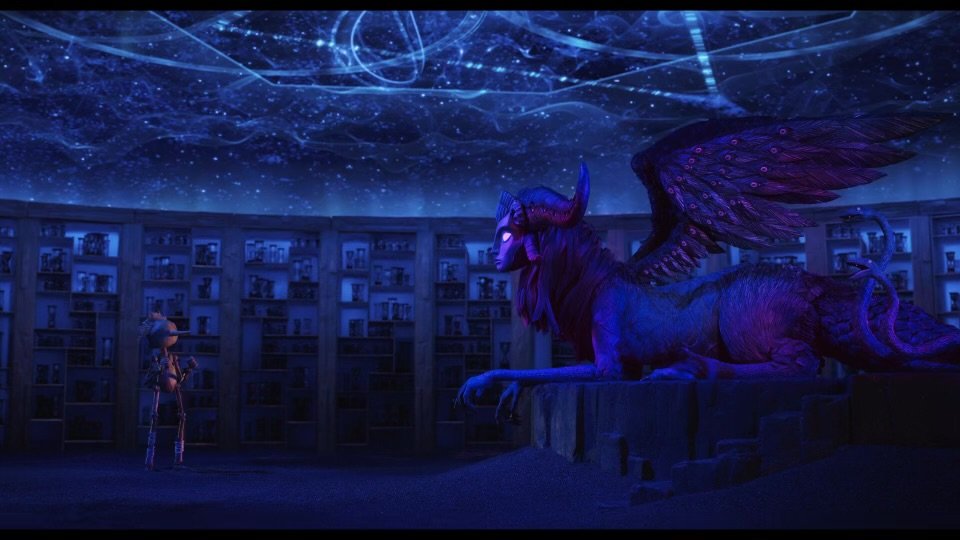Guillermo Del Toro's ‘Pinocchio’ - Review
Despite the multitudes we encapsulate within us, as human beings we are tethered to each other in many ways, our unique stories are but a part of the fabric that holds our shared universal truths and experiences. Some stories are easily told and digested, while others we lock in hidden rooms in our psyche.
One story that usually comes out as a lump in my throat, or a lingering tear on my cheek, is that of my grief. I was 19 years old when I lost my mother, and while this experience is not uncommon, it’s a difficult one to tell. I try to tell it now in poetic mosaics and seek out portrayals of grief in different mediums, but that wasn’t always the case. Five years ago, I couldn’t fathom this unseen, relentless creature named Grief, and I refused to accept it as anything but a foe. All the anger and agony I carried in my heart flung me into the pits of seclusion.
Last year, in my search for stories that resemble mine, I stumbled upon Guillermo Del Toro’s Pinocchio, the beloved tale of a man named Geppetto and the puppet he carved out of sorrow and pine wood. Del Toro’s version brilliantly depicted the complexities of loss, grief and the indelible marks they leave on one’s soul. In this depiction, I found bits and pieces of myself.
The story starts with Geppetto and his son Carlo sharing a beautiful life filled with love and wonder. They fell trees, carve magnificent things out of their wood, and plant the perfect pine cones, because when one life is lost, another must grow. After losing his son in a bombing raid during The Great War, Geppetto sank into the depths of misery, and became the shell of the man he once was, abandoning his work as he fled to the bottom of the bottle. The world moved on, but the weight of loving and losing Carlo filled Geppetto’s heart with anger and despair. Geppetto’s experience held a shard of broken glass in which I saw my own reflection five years ago. In my period of voluntary solitariness, I thought about my mother, about the quiet and sheltered life she’d built for us, only to be taken apart on a random Wednesday night, reduced to nothing but memories and phantoms I desperately chased after. I also mourned the decaying remnants of my previous self and struggled to accept this new hollow version. I, like Geppetto, abandoned all of my passions. I no longer wrote, watched films, or read books. Like a puppet with invisible strings, I latched on to whatever means of productivity society deemed worthy. I was frozen still in time, desperate for any meaningless distraction that would stand against the violent waves of grief.One drunken night, the Wood Sprite consoles Geppetto and grants him Pinocchio and the cricket Sebastian that lived inside where Pinocchio’s heart would be in exchange for a wish. I admired the details of Geppetto creating Pinocchio in the film, from Geppetto calling the pine he once tenderly took care of ‘accursed’ to him carving Pinocchio as Carlo’s picture hangs over the wooden puppet.
As Pinocchio came to life as a boy, his desires to discover the world around him were very real, untamed and wild, and to Geppetto, the exact opposite of what his Carlo was. Despite Geppetto giving him Carlo’s belongings, and making him new feet when he burnt them off just like he made Carlo new shoes the day he died, Geppetto couldn’t truly accept Pinocchio as his son.
The theme of being the obedient child or what I like to call The Perfect Pine Cone reverberated throughout the film. The first thing Geppetto asks of Pinocchio is to obey him, go to school, and be the perfect son. Later, Pinocchio is lured into joining the Circus by the deceitful Count Volpe, who moulds him to be the perfect performer, and when the Podesta finds out the truth of Pinocchio’s immortality he calls him the perfect Italian soldier. So another war is waged, one in which Pinnochio is the bounty.
In the character of Pinocchio, I also saw so much of myself. Growing up, I’ve felt countless times that I must be the perfect pine cone, that I must obey, respect and accept whatever projections authority figures in my life casted onto me. To see the world through the pre-existing lens of an adult. Being an independent thinker like Pinocchio was condemnable. The imperfect nature rooted in our making was unacceptable. I felt a need from an unidentifiable place to conform. As children, we see adults as the epitome of perfection, and we learn that we must do everything to follow suit. Now, I recognize that they’re just as flawed as us and that on the inside they look just like themselves when they were children. And that was the case for Geppetto, an imperfect father, full of resentment towards his creation, demanding Pinocchio to be a perfect son.
When Geppetto called Pinocchio a burden, the cracks in my dam grew bigger and tears flowed freely. The guilt I’ve felt towards my late mother resurfaced. There was always this unspeakable fear inside me that maybe I was a bit too much in her last days of sickness, and after she passed away, the same feeling reemerged in relation to my father. The last thing I wanted to do was burden him or my loved ones with all my feelings, the same feelings he was processing. So I caged them inside, shelved the story of my grief and carried the burden alone just like Pinocchio did when he ran off to the Circus to pay his father’s debts.
Death is not the end, and the film beautifully depicts this belief. As Pinochio encounters death three times, a revelation is unveiled each time. Upon their first meeting, Death informs Pinochio of his immortality and his eternal inability to become a real boy. Pinocchio gleams as he learns this fact, while Death attempts to enlighten him about the truth of life. Death explains that the one thing that makes human life precious and filled with meaning is how fleeting it is. In the second instance, Death reminds him that suffering is an integral part of living, and to be immortal is to suffer eternally. This brought Pinocchio and myself to reflect, being an immortal or in my case an oblivious young person, death echoes loudly with the inescapable truth that every moment you share with your parents or loved ones might be the last grain of sand in the hourglass. In 2018, I couldn’t even begin to comprehend the possibility of losing my mother, even after the doctors informed us that her case was terminal.
As the years went by, I realised that the inherent pain and suffering one feels in these situations walk hand in hand, bound to the happiness and love you once held for your loved ones. Contemplating these inseparable opposing facts helped me understand my grief more.
Leading to the third meeting, Pinocchio dies while trying to save his father and friends from a sea monster. In a final act of rebellion and sacrifice, he defies Death’s rules and comes back to life as a real boy, in order to save his father again from drowning. As the waves carry them to shore, Geppetto’s pleas ascend to the skies as he holds Pinocchio’s rigid body in his hands. The Wood Sprite appears and consoles Geppetto once again in the loss of his terrible joy. The Cricket uses his wish and Pinocchio is resurrected for the final time. This instance Pinocchio is greeted by Geppetto’s unconditional acceptance and love, mirroring Geppetto’s acceptance of his loss of Carlo and finally greeting his grief as a friend. Pinocchio and Geppetto ask nothing of each other but to be themselves.
As Pinocchio comes to fully accept his mortality and Geppetto his grief, this tale of imperfect fathers and imperfect sons healed a part within me and helped me welcome my own grief and its various daunting complexities. The journey of carrying the dead in your heart is a lonesome, tiring one, but it's also an enduring reminder of all the versions of reality that we’ve been a part of. In accepting our grief, we allow ourselves to exist fully, and to live life, albeit briefly but as beautiful glimpses shared with the ones we love. After watching Del Toro’s Pinocchio, I’m a little less afraid to explore what lurks in the shadows of my grief and share it with the world.




